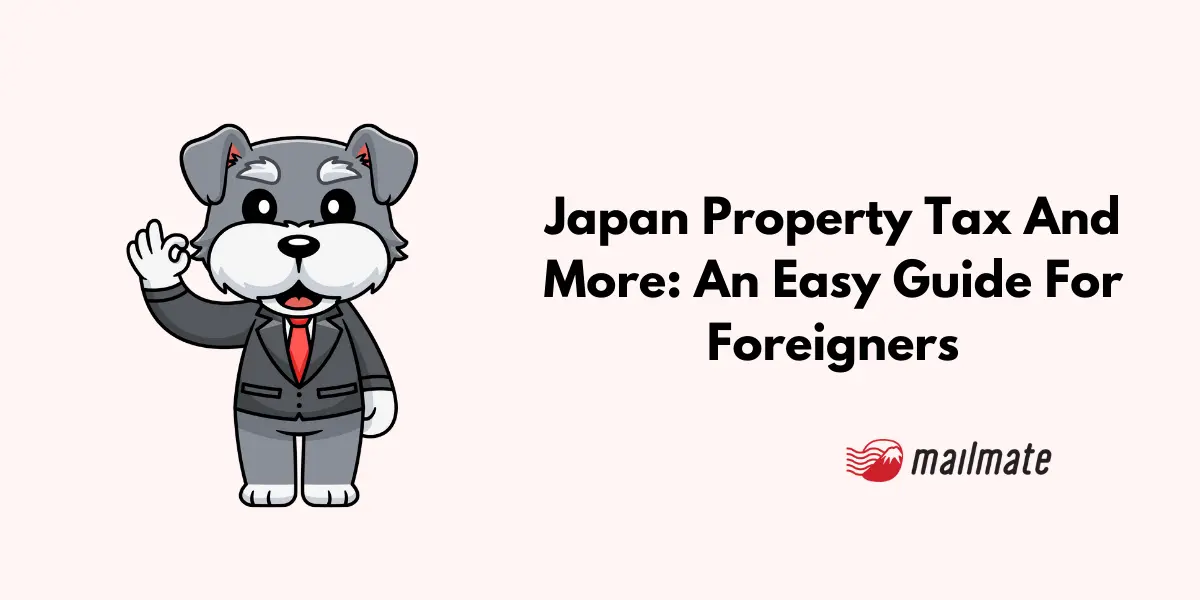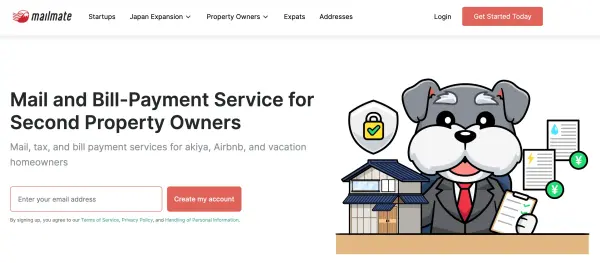Japan Property Tax And More: An Easy Guide For Foreigners

Did you know foreigners and non-residents are allowed to buy property in Japan? It was news to me as well! But what's the catch?
Knowing about taxes in Japan is a must when buying real estate or property in Japan. And things can get complicated quickly—and you'll want to know about property tax and the different types of stamp duties you'll need to pay.
Read on for a comprehensive guide that breaks down the taxes and fees you must pay into simple terms.
1. Taxes you must pay when buying property in Japan

There will be two types of payments when you are signing a contract
a. Real estate acquisition tax (不動産取得税, fudōsan shutoku zei)
Real estate acquisition tax, also known as acquisition property tax, is imposed when a property is officially purchased. It is a one-time tax when you buy property in Japan.
The tax rate will vary, but the government will assess and determine the property's market value. The rate is about 4%; however, the rate is reduced to 3% for residential land and buildings and other conditions.
The tax bill document will be sent to you within six months to a year after purchasing the property.
b. Registry license tax (登録免許税, touroku menkyozei)
Also known as a registration tax, this tax is for transferring or changing property ownership when registering the land or building. This registration and license tax broadly applies to property ownership registrations and is imposed when registering or transferring property.
b.1. How is property registration tax calculated?
Registration and license tax is calculated by applying a tax rate to the assessed value of the land or building (fixed asset tax, 固定資産税, kotei shisan zei). The exact rate depends on the type of registration.
Registration tax for land (based on assessed value)
For land, the tax is calculated using the fixed asset tax appraisal value:
-
2.0% for ownership transfer registrations (such as purchases or gifts)
Reduced to 1.5% for registrations completed by March 31, 2026
0.4% for registrations related to inheritance, corporate mergers, or dividing jointly owned land
Registration tax for buildings (based on assessed value)
For buildings, the calculation also uses the fixed asset tax appraisal value:
0.4% when registering ownership of a newly built home
2.0% when transferring ownership of an existing (used) home through sale or gift
If the property is newly constructed and does not yet have an official fixed asset appraisal value, the tax is calculated using a provisional value certified by the Legal Affairs Bureau.
Registration tax for mortgage loans
When taking a mortgage, a financial institution must register a mortgage lien (collateral right) on the property. This registration also requires a tax payment:
0.4% of the mortgage loan amount
This lien gives the lender priority rights to recover the loan from the sale of the property if repayment is not made.
Registration Type |
What It Applies To |
Tax Base |
Tax Rate |
Notes / Special Rules |
Land – Ownership Transfer |
Purchase, gift |
Fixed asset appraisal value |
2.0% |
Reduced to 1.5% for registrations completed by March 31, 2026 |
Land – Inheritance / Corporate Merger / Division |
Non-sale transfers |
Fixed asset appraisal value |
0.4% |
Applies to inheritance and non-commercial transfers |
Building – Ownership Registration (New Build) |
New residential construction |
Fixed asset appraisal value |
0.4% |
Used when registering ownership for the first time |
Building – Ownership Transfer (Used Home) |
Sale or gift |
Fixed asset appraisal value |
2.0% |
Applies to purchased or gifted existing buildings |
Building – No Appraisal Value Assigned |
Brand-new homes without fixed asset valuation |
Provisional value certified by Legal Affairs Bureau |
Applicable rate above |
Used when official appraisal value is not yet available |
Mortgage Registration |
Registering a mortgage lien |
Mortgage loan amount |
0.4% |
Required whenever financing is used and a lien is registered |
👉 Check out our tax calculator for properties in Japan
c. Stamp duty is a tax on property transactions in Japan.
Both the buyer and the seller pay the stamp duty based on the market value of the property or the amount in the contract, which is part of formalizing the property transaction.
However, tax reductions can apply for certain cases, such as newly built or acquired residential properties, land transactions, and mortgage registration.
The amount will vary depending on the transaction value. Typically, the stamp duty will cost:
Up to 10,000 JPY for a property valued between 10 million to 50 million JPY
Up to 60,000 JPY for a property valued between 100 million to 500 million JPY
(Source: National Tax Agency).
The payment is required when finalizing the contract.
d. Consumption tax (消費税, shōhizei)
Consumption tax (消費税, shōhizei) in Japan is applied to certain aspects of property purchases, especially for business purposes. It's about 10% of the property's sales price, excluding the land.
Buyers can reclaim the tax if the property is rented out following the purchase, specifically for short-term holiday rentals.
Additionally, it only applies to newly built properties, not land. So, buying a house, an akiya house, or property that is a few years old will not have this tax.
2. Taxes when owning property in Japan
Whether you are living in your property or not, you are subjected to two types of taxes while owning your property.
Tax Type |
Applies To |
Standard Rate |
Notes / Exemptions |
Fixed Asset Tax (固定資産税) |
All property owners |
1.4% of assessed value |
Assessed every 3 years; 1/6 land reduction for small residential lots |
City Planning Tax (都市計画税) |
Urban planning areas |
0.3% |
Based on same assessment as fixed asset tax |
a. Fixed asset tax (固定資産税, kotei shisan zei)
Japan fixed asset tax is imposed on any property owners every year on January 1st. You will be billed in four installments throughout the year.
The tax rate is about 1.4% of the property's value based on location, size, condition, and outside market trends. Every three years, the fixed asset tax is recalculated.
If the property is received halfway through the year, the tax amount will be calculated for the time you owned that property.
If you are operating your Japan property from abroad, let MailMate’s Tax Representative Service handle your tax bills and property mail.

MailMate will file the tax representative form on your behalf, making tax compliance easy and stress-free.
b. City planning tax (都市計画税, toshi keikaku zei)
Properties in designated urban areas are subjected to Japan's City Planning Tax. This type of tax is to support any city planning incentives.
This tax, about 0.3% of the property's assessed value, is billed annually and is paid in installments.
How are property taxes in Japan calculated?
Property taxes in Japan are calculated based on the local council's assessed value of the real estate, rather than the purchase price.
Below is a clear breakdown of how the major taxes are calculated and what foreigners can expect to pay.
1. Fixed asset tax
Standard rate: 1.4% of the assessed value
Formula: Fixed Asset Tax = Assessed Value × 1.4%
Special Reductions
Small residential land (up to 200 m²): taxable value is reduced to 1/6
Residential buildings: possible reductions for new homes in the first 3–5 years
Example
A home with an assessed value of 20,000,000 JPY:
20,000,000 JPY assessed value × 0.014 = 280,000 JPY / year
If land qualifies for the 1/6 reduction, the land portion will be significantly lower.
2. City planning tax
Standard rate: 0.3% (Only applies in designated urban planning zones.)
Formula: City Planning Tax = Assessed Value × 0.3%
Example
20,000,000 JPY assessed value × 0.003 = 60,000 JPY / year
3. Taxes when selling property in Japan
a. Capital gains tax (資本利得税, shihonritoku zei)
Capital gains tax applies when a profit is made from selling a property. Both income and residential taxes contribute to the overall capital gain tax rate.
The rate depends on how long the property was owned for:
Short-term capital gain tax: the tax rate is 39% (30% income tax and 9% residential tax) if the property was held for less than 5 years.
Long-term capital gain tax: the tax rate is 20% (15% income tax and 5% residential tax) if the property was held for more than 5 years.
4. Other Japanese property taxes to be aware of

a. Inheritance, estate, and gift taxes
In Japan, inheritance (相続税, sozokuzei), estate, and gift taxes (贈与税, zoyozei) are national taxes imposed on those who receive them. The system will consider factors such as your visa type, residency status, and relationship with the donor if you are a foreigner.
Certain transfers of overseas assets between specific categories outside of Japan may be exempt under certain conditions.
However, the basic exemption for inheritance tax is 30 million JPY plus JPY 6 million JPY per statutory heir. For gift tax, the annual exemption per recipient is 1.1 million JPY.
a.1. Inheritance tax while residing abroad (国外居住中の相続税)
All inherited property are under Japanese taxation, regardless of whether you are in Japan. If you don't reside in Japan when you acquire the property, only the Japanese real estate is taxed. (Source: National Tax Agency).
There are certain conditions for foreign property, too. Mainly concerning your nationality:
Japanese Nationals: If you had a domicile in Japan within 10 years before the decedent's death, both domestic and foreign properties are taxed.
Non-Japanese Nationals: If the decedent was not a foreigner or non-resident, both domestic and foreign properties are taxed.
Gift Taxation: Property received as a gift from the decedent before their death is also subject to inheritance tax.
Your overseas assets are also subject to inheritance tax depending on:
If either the decedent or heir lives in Japan, then assets are taxed.
If both live overseas, and it has been over 10 years since they moved, Japanese tax does not apply to overseas assets.
If either has lived abroad for less than 10 years, overseas assets are also taxed.
a.2. Gift tax while residing abroad (国外居住中の贈与税)
A gift tax is applied when an individual receives property as a gift. The most important factor is the donor's and receiver's residence status in Japan.
Here are 3 example scenarios to help you understand:
Both donor and receiver reside in Japan: All property (domestic and overseas) received as a gift is taxable.
When the donor resides in Japan, and the receiver does not: Only domestic property is taxable.
Only the receiver is a temporary Resident: If the donor is a non-resident foreigner, only domestic property is taxable.
Even when the receiver is temporarily away from Japan, you still have an address in Japan. So they are subjected to taxes for both domestic and overseas property.
So, if you are temporarily away, you must designate a tax agent to help them file and pay the related taxes.
b. Withholding tax
This type of tax is when you receive the property, particularly targeting non-resident sellers. The tax rate is about 10% of the total property price, and it is the buyer's responsibility to deduct and remit the tax to the Japanese tax office.
For overseas sellers, the process involves having the buyer pay the withholding tax to the tax office and having the seller handle the remaining percentage. Real estate agents will handle this process on behalf of the buyer.
c. Income tax
Income tax is applied if the property generates rental income. Thus, the owner is liable for taxes based on the revenue.
For individuals, a progressive tax rate is applied based on an income bracket, with expense deductions for the rental property, such as maintenance, management fees, and loan interest.
Corporations' tax rate depends on the company's revenue and holdings.
For non-residents, owners must file an annual income tax return to report the rental income and any deductions. A tax representative is required to help prepare and submit these tax terms on behalf of the non-resident.
Can I get a refund on Japan property taxes?
Depending on your situation, you can get a refund on the taxes you pay on your property.
a. Refund for income tax (所得税の還付)
If you have income (所得税, shotokuzei) coming from your property, then you are able to get a refund if there was an overpayment on your income tax by filling a final tax reform.
That declaration you make to receive this refund is called a refund declaration.
b. Refund for resident tax (住民税の還付)
If you paid your residency tax twice or your tax amount is reduced after filing your tax return, then you are owed a refund of an overpayment.
c. Tax deferral upon leaving Japan
Whether you are temporarily or permanently leaving Japan, you can apply for a tax deferral to postpone paying your tax temporarily.
For this process, you'll need to appoint a tax agent to help you handle all Japanese tax matters on your behalf while you are abroad.
Exemptions may apply under tax treaties (租税条約に基づく免除の適用)
Japan has tax treaties with 78 jurisdictions, including Australia, Canada, China, France, Germany, India, the United States, and many others.
These tax treaties help people from these countries to claim credits and exceptions to mainly prevent double taxation, including on real estate, gifts, and inheritances.
Frequently asked questions
How much is residence tax in Japan?
Residence tax in Japan is about 10% of your income from the previous year.
What is the property gain tax in Japan?
Also known as capital gain tax, this tax is imposed after selling your property. In summary, if the property was owned for 5 years or less, the tax rate is about 39%. If it was held for more than 5 years, then the rate is about 20%.
How can I pay Japanese property taxes if I live outside Japan?
If you live abroad, you can still pay annual taxes or various property taxes by appointing a tax administrator or using a virtual mail or bill-payment service.
What happens if I miss a payment while overseas?
Late fees and penalties may apply, and unpaid taxes and real estate fees can accumulate interest. If the issue continues, the local government can take collective actions.
Can I pay Japanese property tax by credit card from overseas?
Some municipalities allow online credit card payments, but not all. Even in regions that support online payment, you must physically receive the tax bills and legal paperwork in Japan. This is another reason why overseas property owners appoint a tax specialist.
👉 Go to our Japanese business glossary to learn more about the various tax types in Japan.
In closing
Property taxes and fees in Japan don’t have to be stressful.
Use MailMate's fluently bilingual tax representative service to stay up to date on real estate tax bills!

MailMate's tax rep service includes the following features:
Tax representative for annual real estate tax payments
Domestic point of contact for authorities (required by law)
Bill pay support for property tax payments
Tax notifications with English summaries
A virtual mailbox to receive the mail that arrives at your Japanese property
Manage important property documents and notifications in one place
Other services MailMate offers include utility and Internet setup of your Japanese property!
Founded in 2019, MailMate has simplified property ownership for foreigners living abroad and is an increasingly popular option recommended by users and well-known industry figures.

Navigate Japan's tax system with an experienced tax representative service tailored for foreign property owners!
Spending too long figuring out your Japanese mail?
Virtual mail + translation services start at 3800 per month. 30-day money-back guarantee.

